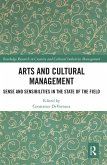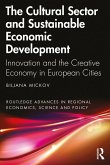Cultural Management and Policy in Latin America provides in-depth insights into the education and training of cultural managers from interdisciplinary and comparative perspectives. The book focuses on the effects of neoliberalism on cultural policies across the region, and questions how cultural managers in Latin America deal not only with contemporary political challenges but also with the omnipresent legacy of colonialism. In doing so, it unpacks the methods, formats, and narratives employed.
Reflecting on emerging and contemporary research topics, the book analyses the key literature and scholarly contexts to identify impacts in the region and beyond. The volume provides scholars, students and reflective practitioners with a comprehensive resource on international cultural management that helps to overcome Western-centric methods and theories.
Reflecting on emerging and contemporary research topics, the book analyses the key literature and scholarly contexts to identify impacts in the region and beyond. The volume provides scholars, students and reflective practitioners with a comprehensive resource on international cultural management that helps to overcome Western-centric methods and theories.
"An unprecedented and fundamental contribution to the field of cultural management and policy studies at a global level ... considering the challenge of the Covid-19 pandemic, this book is indisputably valuable for thinking about cultural policies from and with Latin America." Tomás Peters, Cultural Trends
"This book represents an important milestone in the agenda for diversity and equity for the cultural management discipline. Henze and Escribal carry out an excellent exercise to make visible the research agendas, approaches, and contributions to the discipline, putting empha-sis on the importance of the social, political, and cultural context in which they develop. Decolonising cultural management education is definitely a new priority for the field." Javier J. Hernández Acosta, Universidad del Sagrado Corazón, Puerto Rico
"Cultural rights are fundamental for everyone, everywhere. Solidarity among cultural man-agement professionals is vital to defend the free development of culture and secure its work-ing for citizens in all circumstances. This timely book contributes by offering insights into practices in Latin America and to ideals which are relevant around the world." Johan Kolsteeg, University of Groningen, Netherlands
"Each territory develops its own systems to attend its local specificities. In cultural manage-ment this is not different. This important book provides greater knowledge about current issues at stake in Latin America and the creative solutions provided. It is a highly valuable contribution to spread the 'tecnologias' of this region and inspire researchers and practition-ers in the field in and outside Latin America." Karine Legrand, Goethe-Institut Sao Palo, Brazil
"This book represents an important milestone in the agenda for diversity and equity for the cultural management discipline. Henze and Escribal carry out an excellent exercise to make visible the research agendas, approaches, and contributions to the discipline, putting empha-sis on the importance of the social, political, and cultural context in which they develop. Decolonising cultural management education is definitely a new priority for the field." Javier J. Hernández Acosta, Universidad del Sagrado Corazón, Puerto Rico
"Cultural rights are fundamental for everyone, everywhere. Solidarity among cultural man-agement professionals is vital to defend the free development of culture and secure its work-ing for citizens in all circumstances. This timely book contributes by offering insights into practices in Latin America and to ideals which are relevant around the world." Johan Kolsteeg, University of Groningen, Netherlands
"Each territory develops its own systems to attend its local specificities. In cultural manage-ment this is not different. This important book provides greater knowledge about current issues at stake in Latin America and the creative solutions provided. It is a highly valuable contribution to spread the 'tecnologias' of this region and inspire researchers and practition-ers in the field in and outside Latin America." Karine Legrand, Goethe-Institut Sao Palo, Brazil









